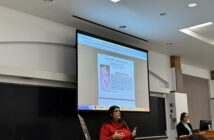
Emily Ward
Lehigh, like all universities, is a business.
When I attended a board of trustees meeting in October, it felt like I had landed a meeting with the CEOs. I looked around at all the trustees, people whose faces I did not recognize but whose decisions emphatically shaped my Lehigh career.
In my closing remarks to the trustees, I called for accessibility and transparency within their committee and Lehigh’s administration. I made the request as the editor in chief of The Brown and White, but more importantly, I made it as a Lehigh student. That label, I feel, entitles me to know the truth from an institution that is supposedly acting with my best interests in mind.
The day after the meeting, the board decided to take “no action” in response to a petition to rescind Donald Trump’s honorary degree from the university. The Brown and White’s comment section and Facebook page erupted in heated debate from students, parents and alumni. Some were thrilled, others were disheartened, but most wanted an explanation from the trustees.
When I tried to reach out to get one, my email was referred to Lehigh’s public relations team.
“The board’s statement is their full commentary on the issue.”
Clearly my message about accessibility and transparency had not gotten through to them.
A week later on Nov. 7, the Lehigh community received an email from the Office of the Provost. It said the university had been made aware of allegations of sexual misconduct by a faculty member.
When I tried to gather more information, I received an eerily similar response from the PR team.
“The statement is the only information available.”
In the weeks since the email was sent out, I have been met with nothing but radio silence from the administration. Unanswered emails. Canceled meetings. Insufficient PR statements.
If the administration won’t cooperate with the newspaper, then how will students receive updates on the investigation? What implications will silence have on this university and the lives of past and future victims?
By operating as a business in an attempt to protect its brand, Lehigh is leaving its students in the dark and putting their safety at risk.
Lehigh praises the contributions made by one of its most prominent alumni, Marty Baron, ’76, the executive editor of The Washington Post. Baron was executive editor of The Boston Globe in 2002 when he led a team of investigative journalists who uncovered decades of sexual abuse within the Catholic Church.
On Nov. 27, Baron made headlines again when The Washington Post discovered it was the target of a sting operation meant to expose bias within the mainstream news media. The operation was unsuccessful — after collecting contradictory information from a woman who falsely accused Roy Moore of impregnating her as a teenager, The Post determined her story a hoax and published the truth.
When students and alumni pursue the truth outside of campus, their actions are celebrated. When it’s on Lehigh’s property, the same rules don’t apply.
Throughout my seven semesters on The Brown and White, I’ve had to explain the role of the media — and the duties of this newspaper — countless times. To students. To faculty. To angry readers. And now, to the administration.
The Brown and White is not a means of free publicity for events or fundraisers. Our writers and editors do not use its pages to promote their agenda. News stories are different from editorials. And no, we will not remove an article just because you don’t agree with it.
But this is what we will do — The Brown and White will continue to strive for the truth. We will honor the legacy of the Lehigh journalism department and its brave alumni. We will refuse to be ignored, silenced or intimidated. And we will always work on behalf of the students who deserve the truth.
The role of the press is to hold powerful institutions accountable, from the Catholic Church to the United States government to universities like Lehigh. This university has provided me with a valuable education, thoughtful friends and meaningful experiences. All I ask for in return — what I asked for in the board of trustees meeting six weeks ago and what I have yet to receive — is accessibility and transparency.
Democracy dies in darkness. The Washington Post made this its official slogan in February.
In his 2014 commencement address at Lehigh, Baron said, “To me, holding power to account is what the press exists to do and what often only the press can and will do.”
I hope to continue the legacy forged by past editors of The Brown and White. I will passionately advocate for students and ceaselessly pursue the truth. In a world where democracy dies in darkness, I’m making sure the lights stay on.
—
Emily Ward, ’18, is the editor in chief for The Brown and White. She can be reached at eaw218@lehigh.edu.





Comment policy
Comments posted to The Brown and White website are reviewed by a moderator before being approved. Incendiary speech or harassing language, including comments targeted at individuals, may be deemed unacceptable and not published. Spam and other soliciting will also be declined.
The Brown and White also reserves the right to not publish entirely anonymous comments.
19 Comments
Awesome article! Keep up the good work??
I worked with Marty Baron on the Brown and White and do you know what we would have done? Journalism. We wouldn’t wait to get spoonfed some statement from P.R., we’d do some actual reporting. You had an opportunity after the Trustees passed on rescinding Trump’s honorary degree. You could have checked public FEC records and told us which political candidates gave money to which candidates. Take some advice from Marty, who said this when accused of being at war with the White House. “We’re not at war with the White House, we’re at work.” That’s where you should be. Stop whining and get to work. PR won’t give you a statement — work around them. Report.
As an addendum to my post on getting comment from the Trustees….Did you call their offices? Email them directly? Did you SEND a student reporter to confront them on video? Waiting for a PR handout is not journalism. Pound the pavement. Knock on doors. Go to the Trustees’ homes and businesses and demand answers. Do it legally, but do it persistently. As for the suspended professor accused of sexual misconduct, SOMEBODY on campus knows who it is. Because some professor isn’t showing up for class and went on a sudden sabbatical. Ask around. Find as many students as you can to confirm the identity of the professor. Then make a decision on whether or not your sourcing is strong enough to publish the story.
Ffs, Rob, they’re not paid journalists. They’re students paying a gazillion a year to go to school there. They have classes that cost insane money and a much more competitive environment than you faced coming out of school. I’m saying they have other claims on their time. Stop yelling at them from the land of “I worked all summer to pay my college tuition and have oceans of time left over for working for free, because god knows I’m going to walk out of college and into leaf-piles of jobs, jobs, jobs, so I’d better splash out on student heroism now.” It’s not 1978 anymore.
Emily, without Rob’s 20th-c gumshoe fantasy, you can start telling the Lehigh community who these trustees are, what their interests are, what they own, who they’re supporting with campaign money, etc. etc. You can do the research online. You can also talk about the non-diversity of Lehigh’s board and how it compares to Lehigh’s student body. hang on —
And no, there was never a more competitive environment for journalists than the Watergate era. The number of journalism majors quadrupled from the time I was a freshman to the time I graduated. Digital offers many, many more opportunities for journalists that I had coming out of Lehigh.
I think maybe you have no current connection to journalism. Digital offers wonderful opportunities for freelance slaves and content robots. And bloggers, who are generally able to write for free. There’s a reason why the j-schools are training the kids to do PR. It’s where most of the paying jobs are. This is important when your kids will be out of college themselves by the time you’ve got your own debt paid off.
Stop and consider what one semester of JOUR:0001 costs now.
Let me gently repeat: It is no longer 1978. Yes, real investigative journalism is necessary. No, it is not reasonable to shout disgustedly at college students because they aren’t doing it.
Shout disgustedly? Hardly. I think given your journalistic background, you should due better due diligence about my connection to journalism now.
They’ll regard you as a temporary nuisance. That’s how they regard all students. You barely exist there before you’re replaced by some other wave of temporary students, aka future donors. You’ll know they’re taking you seriously when one of the VPs summons you in a creepily friendly way for a meeting.
If you want to get the admin’s attention on this matter, publicizing the disparity between the board and its politics and Lehigh’s recent demographics and alumni politics is not a bad way of doing it. I would focus on the last ten years’ grads. The problem in a nutshell is that Lehigh’s major donor class lags Lehigh’s campus reality, but admin keeps on placating it because the trustees can be such powerful fundraisers.Finding friends among the major donors could also be useful and I suspect they’d be open to being interviewed, to a point. Look for women who graduated in the ’70s and ’80s, and see if they’re aware of the gender imbalance on the board, in admin, and in top ranks of faculty (Lehigh still skews heavily male for full professors). Ask them for their views on how Lehigh could be encouraged to be more open about the sort of things you’re describing.
Amy, I sure hope you’re not a paid journalist. I will pay the fees for any student journalist who gets summoned by a VP to have a lawyer represent them at the meeting. Showing which board members donated money to which candidates is a no-brainer — even for a student reporter.
Rob, you’re now yelling at the kids to get off your lawn.
I’m sorry you feel that way. I didn’t get coddled as a student journalist writing for the Brown and White, and neither should the current cohort. You can criticize me all you want with your ageist comments, but you can bet your last tuition dollar that student journalists at Missouri, Northwestern and Columbia still pound pavements and mine data to get to the truth, instead of waiting for the press release.
The hell you weren’t coddled. Adjusted to 2017 dollars, your tuition in 1977 was about $16K. These kids are paying *$46K*. You lived in a world where health insurance was a given, and when you graduated you’d find housing to be a quarter to a tenth of what the kids leaving school pay now, again inflation-adjusted. Do you understand what a tremendous luxury of time you had?
You swam in oceans of time for whatever you wanted, including practicing fourth-estate work.You lived in a world where an ordinary town had three daily newspapers, all with salaried employees. Not one state. One town. Your mistakes disappeared. You lived half your life anonymous, private. But everything follows these kids everywhere. Every debt, every association, every word of conversation like this. Journalism is different now because these things.
You want B&W kids to do some sort of macho act from the distant past, and you don’t consider what underwrote your time. Stop and think.
You’ve also named like the top 3 j-schools (Medill, meh, don’t be so impressed by a name). Take a look at what Columbia costs and consider what kind of safari journalism it means those kids are doing now, who does it and why. No kidding, man, fund those bloggers with that money you’re waving. They’re the action. I’m sure there are good ones near you picking up ravaged/dead/Gannettized/Zelled-dailies slack.
(that’s me up there, too.) Also, a lawyer? Come on. They won’t say anything good if there’s a lawyer. If you have money to throw around like that, though, consider funding strong investigative and analytical independent bloggers, who are today’s IF Stones, or contributing to salary lines or fellowships at larger sites that do good investigative work. People have to be able to afford to do the work, even after the $100-300k a BA costs now. And it can’t just be rich kids doing the work.
Who cares how they regard you? Student journalists need to learn they’re not in a popularity contest. Sometimes the job entails being adversarial.
Amazing job, Emily. You’ve laid out the issues that not only face college newspaper editors, but reporters and editors the world over. And your fighting spirit and tenacity will insure that people are held accountable. Armchair QBs aside, I commend you for your courage to point out the shortcomings of the Lehigh University administration. Keep up the great work!!!
I look at the Brown & White (B&W) as a quality college newspaper attempting to do quality work. I am comparing on a limited basis, University of Georgia (UGA) Red and Black and the East Stroudsburg University (ESU) Stroud Courier. The UGA paper is daily and I likened it to a scandal sheet whereas some articles in the ESU paper seemed unintelligible. Despite the B&W’s overall quality there is a difference between a student journalist trying to do a good job and one who is so passionate that other courses at Lehigh seem to be secondary.
I’m glad that the B&W attracts competent journalists and hope that some passionate journalists are found.